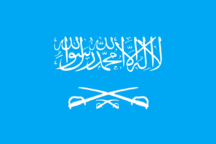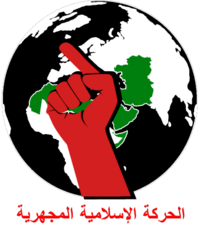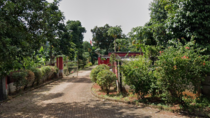Islamic Republic of Olov
Islamic Republic of Olov | |
|---|---|
| Motto: "May Allah (ﷻ) bless our nation and guide us on the path of righteousness." | |
| Capital | |
| Largest city | |
| Official languages | |
| Recognised regional languages | |
| Ethnic groups (2024) |
|
| Religion (2023) | 82.6% Islam (official religion) 12.6% Christianity 3.9% Others |
| Demonym(s) | Olovian |
| Government | Islamic presidential republic |
| Saleh A.H | |
• Vice President | Saleh A.H (acting) |
• Speaker of Parliament | Muhammad Farhan |
| Legislature | Parliament |
| Establishment | |
| 2021-2021 | |
• Reformation | 23 June, 2021. |
• Transition to Islamic republic | 19 July, 2024. |
| Population | |
• 2024 census | 20 |
| HDI (2023) | very high |
| Currency | Indonesian rupiah |
| Time zone | UTC+7 |
| Driving side | left |
Olov, officially the Islamic Republic of Olov (Indonesian: Republik Islam Olov), is an unrecognized secessionist entity under an Islamic presidential republic, it is situated mainly within Depok, South Jakarta, and Nusa Penida (with overseas territories in the Arctic and Indian ocean). The nation currently has three official languages, English, Indonesian, and Arabic.
The nation succeeded its predecessor, the Habasyah Sultanate, it was reformed to a republic on June 13, 2021, and reformed again to an Islamic republic on 19 July, 2024.
The Islamic self-governing state was reformed by Olovian statesman Saleh A.H, who has established the previous sultanate before the reformation. Olov is considered to successfully developed the political and economical-system within its region, with an official constitution that was ratified in 2022.
The structure of the Olovian government is an Islamic presidential republic with a parliament as its legislature. The state consists of two provinces. Van Engels, the administrative capital of the state, has been the historical area from its predecessor Habasyah Sultanate.
Olov is a full member of the Southeast Asian Micronational Association (SEAMA) and a founding member of the Organization of Islamic Micronations (OIM), also a member of the Great Micronational Organization, and a former observer of the League of Independent Nations.
History
Dutch expedition and colonial era
In the early sixth century, European traders began to frequent Javanese ports. The Dutch established a presence in the region through their East India Company. The expedition first landed under the leadership of a Dutch merchant Cornelis Chastelein on May 18, 1696, the main status of the regional-land became a private land owned by Cornelis Chastelein that was separated from the power of the Dutch East Indies.
Pre-micronationalism
Saleh A.H begun to spread the acknowledgement of micronationalism in his community, when he was the class-president in his class. Saleh has also acknowledge secessionism then. He later decided to establish his own self-governing sultanate on March 15, 2021.
Establishment of the Habasyah Sultanate
Sultanate of Habasyah (Arabic: سلطنة الحبسية Salṭanat(u) Habsiah) was a landlocked sultanate located in South Jakarta and East Jakarta. The sultanate was established on March 15, 2021. The following sultanate adopted unitary Islamic absolute monarchy as its government during its pre-beginning of era.
Habasyah was formally presented as an Islamic self governing area. Despite under an isolationist policy, the self-governing area emerged to a severe fall.
Reformation and republic (2021)
Olovian statesman Saleh A.H reformed the state on 23 June 2021, and disbanded the Habasyah sultanate, in-order to avoid external crisis which were occurring within the nation. The presence of the reformation was granted recognition by the commune on 6 July 2021.
By 2021, Olovian nationalists were in charge of authoritative control over regional territories within the nation. Despite the presence of the communist ideals, both sides interfered in the settlement of Ondernaming. Less than three days, the nationalists gained victory and control over the settlement.
During the occurring of the reformation, Saleh A.H inaugurated several Olovian civil servants, administers, and compatriot-politicians as the commissioner and executive of the Olovian government, which were purposed in-order maintain the presence and culmination of the Olovian government.

Post-reformation era and current constitution
Olovian statesman Saleh A.H was inaugurated as the first president of the secessionist entity on 23 June 2021, which holds the executive authority and presidium position as both head of state and head of government, Saleh A.H is also the incumbent president of Olov.
Following the reformation, the Olovian National Party became one of the most largest-ruling commanding parties on the Olovian nation, led by the Olovian president Saleh A.H alongside with Musa Badegel and Muhammad Farhan since 2021-2022. Olovian nationalists formed the political party to expand the idea of Olovian nationalism within the Olovian nation and among its regional territories.
Regional conflicts (2021-2023)
A series of several separatist conflicts and insurgencies broke out within Mainland province since 2021, which was caused by tight control over the media, environmental concerns, limited political freedoms, and economic inequality. In reaction, the Olovian president Saleh A.H previously conducted a widespread surveillance of its territorial areas within the province.
Transition to Islamic Republic (2024-present)
On 19 May, 2024, at approximately 01:29 AM (UTC+7), the Olovian president Saleh A.H declared that the nation would undergo a transformation into an Islamic Republic, thereby abolishing the former unitary democratic secular government. Saleh also stated that the fundamental goals of Olov would remain, and fully encouraged all citizens to embrace the transition with solidarity as the nation enters a new phase of governance under Islamic-based principles.
Geography and climate
The main regional territories of the Olovian Mainland province were situated in the Southern Jakarta in the sub-district of Cilandak and the administrative village of Pondok Labu. All of its mainland territories are landlocked. It has a rain season around September to March and a dry season from around April to August.
| Climate data for Depok | |||||||||||||
|---|---|---|---|---|---|---|---|---|---|---|---|---|---|
| Month | Jan | Feb | Mar | Apr | May | Jun | Jul | Aug | Sep | Oct | Nov | Dec | Year |
| Average high °C (°F) | 29.8 (85.6) |
30.1 (86.2) |
30.9 (87.6) |
31.7 (89.1) |
32.0 (89.6) |
32.0 (89.6) |
32.0 (89.6) |
32.5 (90.5) |
32.9 (91.2) |
33.0 (91.4) |
32.1 (89.8) |
31.0 (87.8) |
31.67 (89) |
| Daily mean °C (°F) | 26.2 (79.2) |
26.4 (79.5) |
26.9 (80.4) |
27.5 (81.5) |
27.4 (81.3) |
27.0 (80.6) |
26.8 (80.2) |
27.3 (81.1) |
27.6 (81.7) |
27.9 (82.2) |
27.9 (82.2) |
26.9 (80.4) |
27.4 (81.3) |
| Average low °C (°F) | 22.6 (72.7) |
22.7 (72.9) |
22.7 (72.9) |
23.0 (73.4) |
22.9 (73.2) |
22.1 (71.8) |
21.7 (71.1) |
21.8 (71.2) |
22.1 (71.8) |
22.6 (72.7) |
22.9 (73.2) |
22.8 (73) |
22.49 (72.49) |
| Average Rainfall mm (inches) | 374 (14.72) |
282 (11.1) |
219 (8.62) |
152 (5.98) |
129 (5.08) |
88 (3.46) |
65 (2.56) |
55 (2.17) |
65 (2.56) |
115 (4.53) |
155 (6.1) |
216 (8.5) |
1,915 (75.39) |
| Source: Climate-Data.org[1] | |||||||||||||
Government
The government is the administrative body of nation, the state is an Islamic presidential republic, based on Sharia law. Both head of state and head of government is the President of Olov, the president may formally serve a maximum of two consecutive four-year terms.
An inauguration of the president and vice president are based on the results of the general election is the policy of the constitution.
Cabinet of the Olovian government
The cabinet of the Olovian government is the main advisory body made up of the heads of various departments, and part of the executive branch. They advise the president on any subject he may require relating to each member’s respective office. The body is officially appointed by the president itself.
| Office | Incumbent | Appointment |
|---|---|---|
| President | Saleh A.H | 20 June 2021 |
| Vice President | Saleh A.H (acting) | 5 May 2023 |
| Minister of Propaganda | Saleh A.H | 21 June 2021 |
| Minister of Foreign Relations | Saleh A.H (acting) | 10 December 2022 |
| Minister of Defense | Saleh A.H (acting) | 3 January 2022 |
| Minister of Religion | Vacant | N/A |
| Minister of Economics | Saleh A.H (acting) | 10 December 2022 |
| Minister of Education | Saleh A.H (acting) | 10 December 2022 |
| Minister of Health | Rafa Alfiyan | 2 January 2022 |
| Minister of Transportation | Vacant | N/A |
Political parties

There are several political parties that has been established in the Olovian nation. The nation has seen a gradual increase in political parties, parties.
| Party | Abbr | Ideology | PRA seats | PRA caucus | ||
|---|---|---|---|---|---|---|
| Olovian National Party (commonly known as the Olov Nationalist Party) | ONP | 5 / 10
|
8 / 10
|
Majority | ||
| Micronational Islamic Party (Olov) | MIP | 1 / 10
|
2 / 10
|
Minority | ||
Military
The Olovian National Military, officially the O.N.M, is the official military force of the state of Olov. It is consisted of the Army, Navy, and Air Force. The president is the commander-in-chief of the armed forces with its severe task and responsibility to protect the state. It was formed on 15 December 2021.
Law and order
The Majlis al-Shura, or Consultative Assembly, is the legislative body of the state, functioning within the Islamic governance. Its role is to ensure that the legislative process aligns with the principles of Sharia and serves the interests of the public. It is led by a Chairman and a Deputy Chairman, elected from among its members.
Foreign Affairs
The executives of the Olovian Ministry of Foreign Relations has agreed on the state conducting diplomacy with the following nations:
Unilateral recognition
 All 193 UN member states and observers, excluding Israel, since 23 June, 2021.
All 193 UN member states and observers, excluding Israel, since 23 June, 2021. Palestine, since 23 June, 2021.
Palestine, since 23 June, 2021. Afghanistan
Afghanistan
Recognition refused
 Israel (considered fascist apartheid entity), since 23 June, 2021.
Israel (considered fascist apartheid entity), since 23 June, 2021. Islamic State
Islamic State
Diplomatic relations include:
 Laskaridia
Laskaridia Recanesia
Recanesia Zarkyiv
Zarkyiv Roscamistan
Roscamistan Shaheenistan
Shaheenistan Dunjakistan
Dunjakistan Pochehova
Pochehova Xennistra
Xennistra Stravonska
Stravonska Pertiwi
Pertiwi Gloria
Gloria Srijaket
Srijaket Marhaenia
Marhaenia Besonia
Besonia
Informal relations include:
Bilateral diplomacy include:
Former relations include:
Administrative divisions
The administrative divisions are divided into seven regions within two different provinces. The following list are the names of each regions, year of establishment, and their respective number of population:
Mainland province
| Flag | Name | Year formation | Area | Population (2022) |
|---|---|---|---|---|
| Van Engels (capital city) | 2021 | 942.40 m² (10,143.87 ft²) | 7 | |
| Al-Amin | 2023 | Under research | 4 | |
| Daamira | 2022 | 1,159.32 m² (12,478.78 ft²) | 5 | |
| Andramin | 2021 | 1,356.71 m² (14,603.52 ft²) | 23 | |
| Badegelk | 2022 (second re-establishment) | 173.28 m² (1,865.14 ft²) | 3 |
Amir province
| Flag | Name | Year established | Area | Population (2022) |
|---|---|---|---|---|
| Amir | 2021 | 11,148.95 m² (120,006.32 ft²) | 5 | |
| Tufan (formerly Arshad) | 2022 | 1,200.00 m² (12,916.69 ft²) | 2 |
Satellite states

The Olovian satellite states (shortened as the OSS), are relatively controlled by the Olovian government under the Saleh administration.
According to the constitution, a satellite territory can gain autonomy or independence provided there are clear specifications, and their residents have the right to request a vote if they feel unsatisfied of the administration.
The following list are the names of each satellite states, year of establishment, and their respective number of population:
| Flag | Name | Year established | Area | Population (2022) |
|---|---|---|---|---|
| Independent Republic of Pertiwi | 2022 |
|
3 | |
| State of Hakrama | 2023 | 129,744.45 m² (1,396,557.63 ft²) | 5 | |
| Republic of Zarkyiv | 2022 | Size under research | 5 | |
| Republic of Wenana | 2023 | Size under research | 4 |
Olovian Overseas Territories
Economy
Despite having a stable marketing economy, Olov relies heavily on imported goods and services from foreign countries, which includes China, with only a few domestically produced Olovian-made products. The economy is primarily centered around agriculture, horticulture, and trade businesses. The currency commonly used is the Indonesian Rupiah.
Agriculture
Agriculture is mainly practiced in the Olovian economy, with one of the leading companies being the Tejo Kripik chain, headquartered in Van Engels, Olov, and it is recognized widely throughout the region, Tejo Kripik is known for its production of local Olovian banana chips, which have become a popular choice and are competing strongly with potato chips nationwide. The government-owned chain continues to produce and distribute banana chips across regional territories, and has gained many profits by its consumers since pre-2022.
Trade business
In Ondernaming, roadside stalls has a major-profitable extent within the region, as a majority of them are a family-owned business. Most of the roadside stalls sells packaged drinks, local snacks, and cigarettes in some areas. During the civil conflict in 2023, stalls were used as a stationary military outpost, with medical needs.
Demographics
Ethnic group
The nation holds a majority of Javanese inhabitants consisting ethnical-minorities of Chinese, Sundanese, and Arab-Indonesians. Olovian statesman Saleh A.H is one of the Arab-Indonesian officials in the Olovian government and is also the first and incumbent president in the state.
Religion
Islam is the official and predominant religion within the republic, with 82.6% of the total population identifying as Sunni Muslims. Christianity, primarily Catholicism, represents 12.6% of the population, while other beliefs, including Buddhism, constitute 3.91% of the total population.
Religious violence remains a significant issue, primarily within the Andramin region, where sectarian divisions have contributed to recurring violence. Notable instances include the 2023 Ondernaming civil conflict, and the ongoing Ojan Crisis, both marked by confrontations between Olovian Muslim forces and Phojam Christian-agnostic militias, with most non-practicing Muslims siding with Phojam.
References
- ↑ "Climate: Bekasi". Climate-Data.org. Retrieved 12 November 2020.
